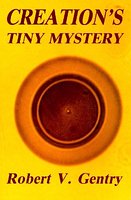|
|
|

|
A physicist's discovery begins an extraordinary odyssey
through
pride and prejudice in the scientific world.
By Dennis Crews
< Prev 1
... 4
5
6
7
8
9
10
11
12
Next >
During Gentry's tenure as a guest scientist at Oak Ridge,
much of his salary had been provided with grant funds from both
private sources and the National Science Foundation. In 1979,
following customary guidelines, he submitted another proposal
to the NSF for further investigation of polonium halos in granite.
Enough of his prior research had been published to forcefully
defend the relevance of his proposal, so this time he clearly
stated the implications of his work with regard to creation.
Five of the six scientists who reviewed the proposal gave it
a "poor" rating, and it went down in flames. Responding with
an emotional vehemence that was most unscientific, these reviewers
faulted Gentry for failing "to look for alternative explanations
of these halos," calling his interpretation of them "speculative"
and "ridiculous." They altogether ignored the ten years he had
spent in painstaking search of a conventional explanation for
the halos, suggesting that the incongruities he had found might
be solved by other researchers "with greater objectivity." Unfortunately
no such researchers came forth to tackle the mystery.
The peer reviews also provided a curious snapshot of scientific
logic in response to perceived threat. One reviewer launched
a baffling non-sequitur by agreeing that Gentry was "probably
the world's foremost expert on the observation and measurement
of radiohalos. He is remarkably tenacious in the pursuit of certain
observations which are difficult to explain. His further work
will result in publication. In the past he has seized on several
quite new techniques.... However, his researches seem to have
reached a dead end."24
If his further work would result in publication, how could
his research have reached a dead end? Was it because he dared
to suggest that creation might resolve the mystery in the rocks?
Could it be that the reviewer was afraid of what Gentry might
publish in the future, and intended to prevent further research
by denying him grant funds? Another reviewer rebuked Gentry for
not accomplishing the work of generations in constructing an
entirely new cosmology, integrating each of the scientific disciplines
in detail while he was at it: "[Gentry] does not discuss the
enormous amount of conflicting evidence which ascribes a long
process of evolution of the universe, the earth, life on earth,
etc. to the present state. If he wishes to propose a new framework
for cosmology, he should describe it in detail, with all of its
supporting evidence, implications, critical observations which
could test it against the 'currently accepted cosmological and
geological framework....'"25
Such criticism served only as a smokescreen for the real issue.
The reviewers could find no conventional way to explain the existence
of the halos. Without such an explanation the uniformitarian
principle, that wonderful philosophical glue that held their
own carefully constructed cosmological system together, disappeared.
It was not Gentry's responsibility to salvage their belief system;
a scientist is an observer of the physical universe, not a philosopher.
Scientific theories arise from observation, and when new observations
falsify previously held theories those theories must be modified
or discarded.
Nevertheless in classic medieval fashion, the establishment
showed a preference for hanging the messenger rather than heeding
the message. They justified their rejection by calling Gentry's
work irrelevant and repetitive, and some critics even impugned
his reliability because he had been objective enough to modify
his own theories on superheavy elements as his and his colleagues'
research had progressed. Despite repeated attempts, Gentry never
again received research funding from the National Science Foundation.
In 1981 the Arkansas state legislature passed Act 590, a bill
requiring "balanced treatment of creation-science and evolution
in public schools." A cry of alarm went up from evolutionists
everywhere. They rallied under the banner of the American Civil
Liberties Union, which filed a suit challenging the constitutionality
of the act. The trial was set for December 7 at the Federal District
Court in Little Rock.
Two months before the trail date the Deputy Attorney General
called Robert Gentry and asked him to testify as an expert witness
for the State of Arkansas. It would be a momentous decision.
Gentry realized that his cooperation with the state in this trial
would likely sever whatever support remained for him in the scientific
establishment. Was the truth about polonium halos important enough
to sacrifice whatever was left of his career? His silence, he
believed, would only contribute to the suppression of facts,
which in turn would rob people of the opportunity to choose intelligently
what to believe. He agreed to testify.
24 Gentry, 1986. Creation's Tiny Mystery, chapter 6. Knoxville: Earth Science Associates.
25 Ibid.

 |
For readers interested in a more comprehensive treatment of this story, Robert Gentry's book, Creation's Tiny Mystery, is available for $18 (U.S.) + S/H.
To order our book and/or videos,
Shop at our Online Store.
|
|
|
< Prev 1
... 4
5
6
7
8
9
10
11
12
Next >
|

|

